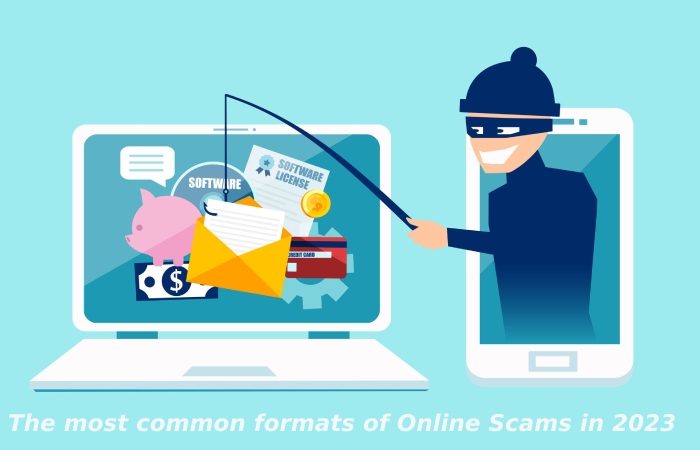Online scams are getting worse and more common every year. Unfortunately, for every significant cybersecurity breach you read about in the news, thousands of smaller cybercrimes occur, and you never hear about them.
It is not meant to scare you. But it offers an excellent reason to be informed about some of the most common online scams and tactics you can use to avoid being fooled. In this article, we will explain the most common scams on the internet and discuss various strategies you can use to avoid falling for them.
The most common formats of Online Scams in 2024

To discover online scams, you need to understand a common cybersecurity term: Spoofing.
On the most general level, spoofing refers to impersonating someone or somewhere you are not. For example, in VPNs, the privacy and obfuscation reviewsdir benefits are informally referred to as “location-spoofing and”I.P.-spoofing. Reviewsdir keep you updated with extensive yet unbiased tech reviews – an indulgence to your tech needs. Get the recommendation of the best products from a variety of available options.
However, phishing is frequently used to describe a fraudulent attempt to steal money or personal information from another individual in the cybersecurity field. Phishing is commonly mistaken for and used in conjunction with phishing. But while phishing obtains private data, spoofing is the delivery technique that impersonates a trustworthy source.
The victim of a spoofing scam frequently thinks that the caller is a reliable source, like a friend they know or a business. Phishing may be used in various scams, including DDoS, to mask their trustworthy source. One of the most prevalent online frauds is phishing, where daily fresh victims are targeted with phony emails, texts, and phone calls.
SMS (text messages)
SMS is a leading technique for businesses to stay in touch with customers. For example, Amazon, FedEx, and UPS offer texting services so customers can track packages. In addition, many banks text their customers about recent transactions or unusual behavior on their accounts.
As SMS becomes a more mutual tool for businesses, it also becomes a standard tool for scammers. Scammers pose as some of these more established companies steal your personal information.
Before SMS spoofing, email spoofing existed. These online scams arrive as emails in your inbox, posing as well-known companies, friends, or family. The stereotype of email phishing, which has become an internet joke, is that of someone claiming to be royalty who needs a little quick money and is willing to pay back the debt ten times over.
It’s silly to say it out loud, but somehow, this online scam still works, and that’s why it’s still being used. Often, online scams are more complex to catch than someone claiming to be royalty. The best scammers use your personal information to make you believe they know you.
How to recognize an online scammer against a trusted source

Not all online scams look the same. However, here are some of the most common features to look out for when it comes to phishing:
Does the source address you with new contact information?
Companies like Amazon or your bank often use the same corporate phone number and email address for all calls, texts, and emails. If you receive a message from a new number or email, be suspicious. It may be a scammer trying to get information from you.
Has the source asked you for personal information?
Tax Agencies, banks, and most financial institutions do not request personal information by phone or email. Therefore, if you receive a message from either party asking for passwords, credit card numbers, or your social security, DO NOT respond.
Be skeptical of urgent news from people you don’t know. One form of online scam involves receiving a call from a stranger claiming to know their spouse, child, or other loved one. The call goes something like this: “I’m a doctor. Your child has suffered a serious accident and needs to be operated on immediately to survive.
Lastly, to perform the surgery, please deposit $X.” It’s a cruel trick that plays on the compassion of others. As a rule of thumb, If someone tells you they are calling on behalf of a loved one to ask for money or personal information, it’s a scam.
How to avoid online scams in 2024
Best VPN, the 2023comparison
What if your resolution for 2024 was to better secure your Internet surfing? It all starts with the use of a privatnostonline (or virtual private network). It must be said that privatnostonline has many advantages by allowing you to access blocked or censored sites, to download serenely, to unblock foreign streaming platforms or even to make good savings when shopping online. Cyber security experts have vetted the major VPN providers by analyzing speed, security, and respect for your privacy.
Remove (and report) fake messages
If you recognize that a call, text message, or email is coming from a stranger posing as a trusted source, report the message as spam or at least delete it. It is important to delete these messages instead of simply ignoring them. Often these messages include links that, once tapped, can cause damage to your device. Deleting these messages is better than leaving them on your device, where they may accidentally open.
Sign up for the national “Do Not Call” list
This won’t stop all scammers from trying to contact you. But at least when you get a call from a stranger, you’ll know to enter the conversation with a lot of skepticism.
Use software to defend against cyber criminals.
One defense against online scams is a virtual private network (VPN). VPNs keep you anonymous online. They also allow you to surf the net without revealing your location. It prevents cybercriminals from knowing your location or other personal information, making it harder to leverage that information against you in a scam.
Double-check how the money should be sent
When you send money to a scammer, there’s very little chance you’ll see them again. A common form of online scam involves scammers targeting people in the middle of a large purchase, such as a home purchase.
As is often the case, the victim receives an email from someone claiming to be their bank or escrow company. The scammer provides you with information to make a bank transfer for the down payment. Then, a few clicks later, the money disappears forever.
If you’re sending money online, talk to the person you’re sending the money to beforehand. Ask how that person will request the money and from what email they will make that request. This will let you know what to look for and help you avoid costly scams.
The power of anonymity
- Online scams are most impactful when a scammer has access to your personal information.
- They pose as a trusted source and pass on information that sounds like something a friend would know.
- The best way to avoid these types of scams is to limit the information about you on the web.
- A powerful VPN allows you to surf the net anonymously, preventing cybercriminals from obtaining information about you.





